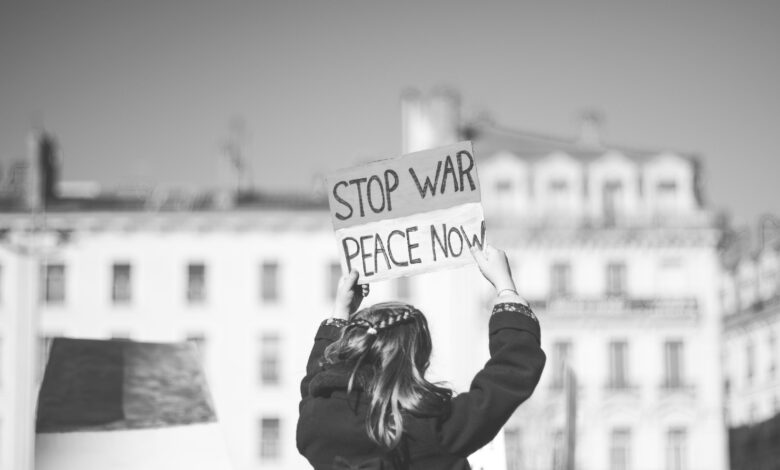
“2024 is around the corner,” the speaker said and paused. It must have been thirty or forty seconds before he took two steps forward, stared at the audience and asked: “Will we wake up?”
I was sitting in the third row facing the stage where the renowned historian Ralph Parsons was addressing the audience of no less than 500 students, guests, and educators.
Parsons, walking up and down the stage like a captured tiger, had been speaking for more than forty minutes, using his arms and pointing at the huge screen behind him to emphasize the topics he was addressing.
As he asked the question and moved slowly off stage, the audience broke into a loud applause. Many people stood up and the cheering must have gone for at least three to four minutes, no small feat after he had left the stage. He did not return.
I was a guest of Mary Butler, the energetic, charismatic, and very sharp Vice President of Development at the University. As we stood up, she motioned me to the side door, and we walked through it to a hall that took us to a sitting room where there were four people, none of which I knew.
Mary introduced me to the others who also were in the audience but left the speakers room moments ahead of us. Professor James Greenblatt, a political science lecturer that looked out of central casting with white hair and beard, black rimmed glasses, and a rumpled gray suit with a twisted red tie. Matthew (Matt) Stearn, a middle-aged local politician of conservative leaning, introduced himself as a moderate Republican. Stearn was in a navy suit, open white crisp shirt and at least six foot two. Julia Mathews, a doctorate student, explained that her research was utilizing algorithms to predict geopolitical risk. Julia was in a grey dress and sneakers. Finally, sitting somewhat aloof, was a stunning Greta Garbo lookalike who was reading a document. Carol Wright was a University trustee and apparently the person behind inviting Ralph Parsons to address the audience.
Mary invited us all to the nicely laid out table with coffee, tea, sodas, fresh juice, and an assortment of biscuits. We all helped ourselves and sat on a sofa and comfortable chairs in a semi-circle. Mary turned to Carol thanking her for bringing Parsons. Professor James Greenblatt, sipping nosily on a mug of hot piping tea, said in a deep voice: “Brilliant, but so depressing.”
Matt, going back to the buffet table and grabbing more biscuits, said standing up that what Parsons did was an amazing tour de force exposing what is facing us, but we do not recognize the facts laid out in front of us. As Matt was sitting down, he added that Parsons was overwhelming in his research and detail reflecting the state of the world. He continued: “From Zelensky* in June last year announcing that his people are his priority but leaving them to their disastrous fate till now… to Walt Disney who must be rolling in his grave as he witnessed Disneyland focused on becoming a promoter of LGBTQ to its children visitors, with its website offering rainbow colored dog leashes, Mickey Mouse pins in the transgender flag colors, cartoons with gays as heroes, and having Gay Days at the theme parks.”
Carol said: “Parsons does not hold back. He is very worried.” Carol spoke in a low voice. I leaned forward as she described how Parsons talked about the state of the world…She described how the war in Iraq, Afghanistan and Ukraine killed, maimed, traumatized and destroyed the lives of millions…the pictures Parsons showed, she said, had some of the audience in tears…then she referred to the refugee crisis worldwide from the Uyghurs in China, to the Rohingya in Myanmar to the Ukrainians flowing all over Europe, to the Iraqis, Syrians, Sudan and Yemenis, not to mention all of the people trying to cross from Central and South America through Mexico to the United States.
As Carol was speaking about refugees, I remembered that Egypt was presently hosting over nine million refugees without one camp, giving them total equality with the 98 million Egyptian citizens.
As I was pondering that thought, Carol looked at me and Mary beside me and asked “Do you remember the photograph of the young child alone in a cardboard box labeled ‘France’ being sent from Italy as you would ship an animal to France?” The picture of the little child in the cardboard box, another picture of women and children in a sinking boat off the coast of Italy and freezing families in the Ukraine fleeing to neighboring countries had many in the audience covering their eyes.
Julie, twisting in her chair to face Carol, said that what struck her was the photo Parsons displayed showing millions of vaccines being destroyed in the US and UK whilst millions of people in Africa and Asia had no access to the proper vaccines. “Worse”, she added, “was that the world failed and continues to fail to come up with a framework to pool medical and scientific research to combat disease and pandemics and establish efficient and effective manufacturing and distribution channels.”
Just as Julie was ending her comments, the door opened and an African American gentleman walked in, dressed impeccably in a dark navy double breasted suit, a blue polka dot tie on a cream French cuffed shirt. He walked in with an unlit pipe in his left hand and greeted Mary who introduced him as Dr. Martin Kirk, an economist at a major think tank in London who was visiting.
Kirk helped himself to a coffee and sat beside James, as it was obvious that they both knew each other well. Suddenly the door opened again and in march Ralph Parsons and a young lady at his side. Carol hugged Parsons and introductions followed easily as he had a warm and approachable attitude.
Parsons introduced Amy as his PA. Amy was dressed professionally with her hair in a bun, frameless glasses and carrying a dark brown brief case matching her flat shoes and belt. James congratulated Parsons on his in-depth lecture but said: “Ralph, it’s depressing.” Ralph smiled and said: “This was the ‘light version’, I did not want to give you the heavy version.”
Julie stood up and interjected: “Prof. Parsons, you spoke about war, refugees, the pandemic, the economic challenges, inflation, poor education, poverty, homelessness, food shortages, civil unrest…” she paused: “what did you leave out?”
Parsons flashed a smile but before he could respond, Kirk commented: “Julie, you forgot he spoke about deglobalization, supply chain fractures, systemic dysfunctional sanctions with unintended consequences and growing interventionist economics, not to mention the complete failure of global institutions that have become expensive, ineffective mouth pieces.” Parsons’ smile grew and he said: “Thank you Martin, you were listening.” I looked around. Amy was taking notes, Mary was on her cell phone in the corner, the rest looked at Parsons awaiting his response to Julie. I sat quietly, listening and learning.
Parsons’ smile vanished and he looked straight at Julie and said: “You and Amy are the youngest here.” He paused, took a sip. “In brief,” he added, “the heavy version is that humanity is lost. Moreover”, he continued, “we are on a leaderless Earth faced with technological advances that cut both ways, for the better and the worse. More critically, we are approaching 2024 sleepwalking with no moral compass, destroying our basic human values and killing each other.” Parsons continued speaking in a level voice: “Julie, we lost the battle to the wrongs, forgetting our true gender to hallucinations of the mindless, killing human beings for real estate, developing lethal war machines instead of protecting the Earth and dangerously setting aside the wrong to be able to survive instead of facing it to correct our path for your generation and the generations to come.”
Silence gripped the room. Mary came back from her phone call with a broad smile asking cheerfully: “What did I miss?” Ralph said: “Nothing, can I have more coffee?” As Mary obliged, I sat like the Sphinx, wondering what the chances are that 2024 can initiate a corrective path. The question hung in my mind as I thanked Mary and all those present and walked quietly to the exit to find my car.
About the author
M. Shafik Gabr is a renowned leader in international business, innovation, investment and one of the world’s premier collectors of Orientalist art, and an accomplished philanthropist.
During his career, Gabr established over 25 companies plus three investment holding companies including ARTOC Group for Investment and Development which, established in 1971, is a multi-disciplined investment holding company with businesses in infrastructure, automotive, engineering, construction and real estate, over the past three years focusing on investment in technology and artificial intelligence.
Gabr is the Chairman and a founding member of Egypt’s International Economic Forum, a member of the International Business Council of the World Economic Forum, a Board Member of Stanhope Capital, an International Chairman of the Sadat Congressional Gold Medal Committee, and a Member of the Parliamentary Intelligence Security Forum. Gabr is a Member of the Metropolitan Museum’s International Council and serves on the Advisory Board of the Center for Financial Stability, the Advisory Board of The Middle East Institute, and the Global Advisory Council of the Mayo Clinic.
Through the Shafik Gabr Social Development Foundation, Gabr is helping to improve elementary-school education in Egypt, introducing students to arts and culture and promoting sports and physical fitness for youth. The Foundation has its first Medical and Social Development Center in Mokattam, Cairo, offering free medical and health services. In 2012 Gabr established in the US the Shafik Gabr Foundation which supports educational and medical initiatives plus launched in November 2012 the ‘East-West: The Art of Dialogue initiative promoting exchanges between the US and Egypt with the purpose of cultural dialogue and bridge-building.
Gabr holds a BA in Economics and Management from the American University in Cairo and an MA in Economics from the University of London.




